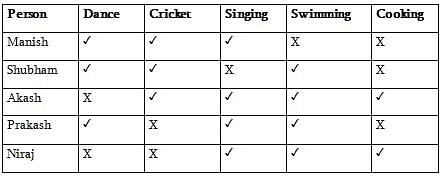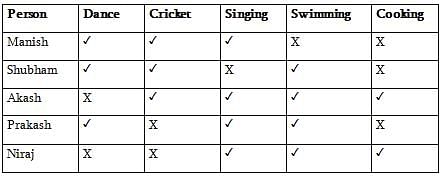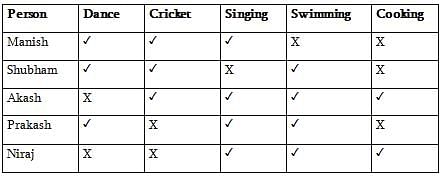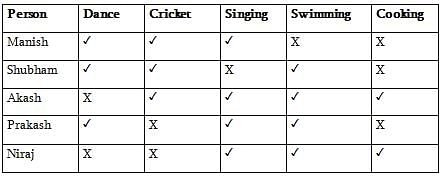UPSC CSE Prelims Paper 2 Practice Test - 3 - UPSC MCQ
30 Questions MCQ Test - UPSC CSE Prelims Paper 2 Practice Test - 3
Correct the given equations by interchanging the two signs (10 - 14 ÷7 x 3 + 4 = 20)
Select the correct set of symbols which will fit in the given equation 5 0 6 8 = 48
| 1 Crore+ students have signed up on EduRev. Have you? Download the App |
Direction for: Each of the following questions is based on the following information:
1. Six flats on a floor in two rows facing North and South are allotted to P, Q R, S, T and U.
2. Q gets a North facing flat and is not next to S.
3. S and U get diagonally opposite flats.
4. R next to U, gets a south facing flat and T gets North facing flat.
If the flats of P and T are interchanged then whose flat will be next to that of U?
Direction for: Each of the following questions is based on the following information:
1. Six flats on a floor in two rows facing North and South are allotted to P, Q R, S, T and U.
2. Q gets a North facing flat and is not next to S.
3. S and U get diagonally opposite flats.
4. R next to U, gets a south facing flat and T gets North facing flat.
Which of the following combinations get south facing flats?
Direction for: Each of the following questions is based on the following information:
1. Six flats on a floor in two rows facing North and South are allotted to P, Q R, S, T and U.
2. Q gets a North facing flat and is not next to S.
3. S and U get diagonally opposite flats.
4. R next to U, gets a south facing flat and T gets North facing flat.
The flats of which of the other pairs than SU, is diagonally opposite to each other?
India is rushing headlong towards economic success and modernisation, counting on high- tech industries such as information technology and biotechnology to propel the nation to prosperity. India’s recent announcement that it would no longer produce unlicensed inexpensive generic pharmaceuticals bowed to the realities of the World Trade Organisation while at the same time challenging the domestic drug industry to compete with the multinational firms. Unfortunately, its weak higher education sector constitutes the Achilles heel of this strategy. India’s main competitors especially China but also Singapore, Taiwan, and South Korea are investing in large and differentiated higher education systems. They are providing access to large numbers of students at the bottom of the academic system while at the same time building some research based universities that are able to compete with the world’s best institutions. There are a small number of high quality institutions, departments, and centres that can form the basis of the quality sector in higher education. India Educates approximately 10 percent of Its young people in higher education compared with more than half in the major industrialized countries and 15 percent in China. Almost all of the world’s academic systems resemble a pyramid, with a small high quality tier at the top and massive sector at the bottom. India has a tiny top tier. None of its universities occupies a solid position at the top. A few of the best universities have some excellent departments and centres, and there are a small number of outstanding undergraduate colleges.
Q. By what measures can you say that the Asian countries, other than India, are heading towards a knowledge based economy?
1. Building competitive research based universities.
2. Investing in diverse higher education systems,
3. Providing access to higher education to a select few students.
India is rushing headlong towards economic success and modernisation, counting on high- tech industries such as information technology and biotechnology to propel the nation to prosperity. India’s recent announcement that it would no longer produce unlicensed inexpensive generic pharmaceuticals bowed to the realities of the World Trade Organisation while at the same time challenging the domestic drug industry to compete with the multinational firms. Unfortunately, its weak higher education sector constitutes the Achilles heel of this strategy. India’s main competitors especially China but also Singapore, Taiwan, and South Korea are investing in large and differentiated higher education systems. They are providing access to large numbers of students at the bottom of the academic system while at the same time building some research based universities that are able to compete with the world’s best institutions. There are a small number of high quality institutions, departments, and centres that can form the basis of the quality sector in higher education. India Educates approximately 10 percent of Its young people in higher education compared with more than half in the major industrialized countries and 15 percent in China. Almost all of the world’s academic systems resemble a pyramid, with a small high quality tier at the top and massive sector at the bottom. India has a tiny top tier. None of its universities occupies a solid position at the top. A few of the best universities have some excellent departments and centres, and there are a small number of outstanding undergraduate colleges.
What did India agree to do at the behest of the World Trade Organisation?
India is rushing headlong towards economic success and modernisation, counting on high- tech industries such as information technology and biotechnology to propel the nation to prosperity. India’s recent announcement that it would no longer produce unlicensed inexpensive generic pharmaceuticals bowed to the realities of the World Trade Organisation while at the same time challenging the domestic drug industry to compete with the multinational firms. Unfortunately, its weak higher education sector constitutes the Achilles heel of this strategy. India’s main competitors especially China but also Singapore, Taiwan, and South Korea are investing in large and differentiated higher education systems. They are providing access to large numbers of students at the bottom of the academic system while at the same time building some research based universities that are able to compete with the world’s best institutions. There are a small number of high quality institutions, departments, and centres that can form the basis of the quality sector in higher education. India Educates approximately 10 percent of Its young people in higher education compared with more than half in the major industrialized countries and 15 percent in China. Almost all of the world’s academic systems resemble a pyramid, with a small high quality tier at the top and massive sector at the bottom. India has a tiny top tier. None of its universities occupies a solid position at the top. A few of the best universities have some excellent departments and centres, and there are a small number of outstanding undergraduate colleges.
Which of the following are India’s weaknesses when it comes to higher education?
1. Indian universities do not have the requisite teaching faculty to cater to the needs of the higher education sector.
2. Only five Indian universities occupy the top position very strongly, in the academic pyramid, when it comes to higher education.
3. India has the least percentage of young population taking to higher education as compared to the rest of the comparable countries.
Virtually everything astronomers known about objects outside the solar system is based on the detection of photons—quanta of electromagnetic radiation. Yet there is another form of radiation that permeates the universe: neutrinos. With (as its name implies) no electric charge, and negligible mass, the neutrino interacts with other particles so rarely that a neutrino can cross the entire universe, even traversing substantial aggregations of matter, without being absorbed or even deflected. Neutrinos can thus escape from regions of space where light and other kinds of electromagnetic radiation are blocked by matter. Furthermore, neutrinos carry with them information about the site and circumstances of their production: therefore, the detection of cosmic neutrinos could provide new information about a wide variety of cosmic phenomena and about the history of the universe.
With which of the following statements regarding neutrino astronomy would the author be most likely to agree?
Virtually everything astronomers known about objects outside the solar system is based on the detection of photons—quanta of electromagnetic radiation. Yet there is another form of radiation that permeates the universe: neutrinos. With (as its name implies) no electric charge, and negligible mass, the neutrino interacts with other particles so rarely that a neutrino can cross the entire universe, even traversing substantial aggregations of matter, without being absorbed or even deflected. Neutrinos can thus escape from regions of space where light and other kinds of electromagnetic radiation are blocked by matter. Furthermore, neutrinos carry with them information about the site and circumstances of their production: therefore, the detection of cosmic neutrinos could provide new information about a wide variety of cosmic phenomena and about the history of the universe.
According to the passage, one advantage that neutrinos have for studies in astronomy is that they
In which direction is A from B?
Statement- (1) C is in the South from B which is in the West of A.
Statement- (2) B and D is in a straight line and D is in the South from A.
Directions: Symbols %, #, $, © are used with different meanings as explained below:
‘P @ Q’ means ‘P is not greater than Q’.
‘P % Q’ means ‘P is neither greater than nor equal to Q’.
‘P # Q’ means ‘P is neither smaller than nor equal to Q’.
‘P $ Q’ means ‘ P is neither smaller than nor greater than Q’ .
‘P © Q’ means ‘P is not smaller than Q’.
Three statements showing relationships have been given, which are followed by two conclusions (1) and (2). Assuming that the given statements are true, find out which conclusions(s) is/are definitely true.
Statements — M $ K, K © F, F % H. Conclusions—
1. M # F
2. M $ F
Directions: Study the following information carefully and answer the questions that follow.
Manish and Shubham are good in Dance and Cricket. Akash and Manish are good in Cricket and Singing. Akash, Prakash and Niraj are good in Singing and Swimming. Niraj and Akash are good in Singing and Cooking. Prakash and Shubham are good in Swimming and Dance.
Who is good in Cricket, Swimming and Dance?
Directions: Study the following information carefully and answer the questions that follow.
Manish and Shubham are good in Dance and Cricket. Akash and Manish are good in Cricket and Singing. Akash, Prakash and Niraj are good in Singing and Swimming. Niraj and Akash are good in Singing and Cooking. Prakash and Shubham are good in Swimming and Dance.
Who is good in Singing, Dance and Cricket?
Directions: Study the following information carefully and answer the questions that follow.
Manish and Shubham are good in Dance and Cricket. Akash and Manish are good in Cricket and Singing. Akash, Prakash and Niraj are good in Singing and Swimming. Niraj and Akash are good in Singing and Cooking. Prakash and Shubham are good in Swimming and Dance.
Who is good in Singing, Swimming and Dance?
Directions: Study the following information carefully and answer the questions that follow.
Manish and Shubham are good in Dance and Cricket. Akash and Manish are good in Cricket and Singing. Akash, Prakash and Niraj are good in Singing and Swimming. Niraj and Akash are good in Singing and Cooking. Prakash and Shubham are good in Swimming and Dance.
Who is good in Singing, Swimming and Cooking but not in Cricket?
Despite the best efforts of those responsible for preventing fraud, one inevitable reality remains: “fraud happens.” Because fraud and misconduct can occur at various levels in any organization, it is essential that appropriate preventive and detective techniques are in place. Although fraud prevention and detection are related concepts, they are not the same. While prevention encompasses policies, procedures, training, and communication, detection involves activities and programs designed to identify fraud or misconduct that is occurring or has occurred. Although preventive measures cannot ensure that fraud will not be committed, they are the first line of defence in minimizing fraud risk. One key to prevention is making personnel throughout the organization aware of the fraud risk management program, including the types of fraud and misconduct that may occur. This awareness should enforce the notion that all of the techniques established in the program are real and will be enforced. The ongoing communication efforts could provide information on the potential disciplinary, criminal, and civil actions that the organization could take against the individual. With this in mind, prevention and deterrence are interrelated concepts. If effective preventive controls are in place, working, and well-known to potential fraud perpetrators, they serve as strong deterrents to those who might otherwise be tempted to commit fraud. Fear of getting caught is always a strong deterrent. Effective preventive controls are, therefore, strong deterrence controls.
According to the passage, what is the fundamental difference between fraud prevention and fraud detection?
Despite the best efforts of those responsible for preventing fraud, one inevitable reality remains: “fraud happens.” Because fraud and misconduct can occur at various levels in any organization, it is essential that appropriate preventive and detective techniques are in place. Although fraud prevention and detection are related concepts, they are not the same. While prevention encompasses policies, procedures, training, and communication, detection involves activities and programs designed to identify fraud or misconduct that is occurring or has occurred. Although preventive measures cannot ensure that fraud will not be committed, they are the first line of defence in minimizing fraud risk. One key to prevention is making personnel throughout the organization aware of the fraud risk management program, including the types of fraud and misconduct that may occur. This awareness should enforce the notion that all of the techniques established in the program are real and will be enforced. The ongoing communication efforts could provide information on the potential disciplinary, criminal, and civil actions that the organization could take against the individual. With this in mind, prevention and deterrence are interrelated concepts. If effective preventive controls are in place, working, and well-known to potential fraud perpetrators, they serve as strong deterrents to those who might otherwise be tempted to commit fraud. Fear of getting caught is always a strong deterrent. Effective preventive controls are, therefore, strong deterrence controls.
How the HR department of an organization can play a vital role in the prevention of fraud in the company?
Despite the best efforts of those responsible for preventing fraud, one inevitable reality remains: “fraud happens.” Because fraud and misconduct can occur at various levels in any organization, it is essential that appropriate preventive and detective techniques are in place. Although fraud prevention and detection are related concepts, they are not the same. While prevention encompasses policies, procedures, training, and communication, detection involves activities and programs designed to identify fraud or misconduct that is occurring or has occurred. Although preventive measures cannot ensure that fraud will not be committed, they are the first line of defence in minimizing fraud risk. One key to prevention is making personnel throughout the organization aware of the fraud risk management program, including the types of fraud and misconduct that may occur. This awareness should enforce the notion that all of the techniques established in the program are real and will be enforced. The ongoing communication efforts could provide information on the potential disciplinary, criminal, and civil actions that the organization could take against the individual. With this in mind, prevention and deterrence are interrelated concepts. If effective preventive controls are in place, working, and well-known to potential fraud perpetrators, they serve as strong deterrents to those who might otherwise be tempted to commit fraud. Fear of getting caught is always a strong deterrent. Effective preventive controls are, therefore, strong deterrence controls.
What is the strong deterrent for fraud according to this passage?
One year ago, the ratio between Rajeev’s salary and Shivani’s salary is 4:5. The ratio between their individual salary of the last year and current year is 2:5 and 10: 11 respectively. If the total current salary of Rajeev and Shivani is 6200. Then find the current salary of Shivani?
There is a Hockey match of Dhyanchand tomorrow, at Motera stadium. In recent years, it has rained only 73 days each year. Unfortunately, the weatherman has predicted rain for tomorrow. When it actually rains, the weatherman correctly forecasts rain 80 of the time. When it doesn't rain, he incorrectly forecasts rain 20 of the time. What is the probability that it will rain on the day of Dhyanchand's Hockey match?
Study the following table and answer the question based on it.
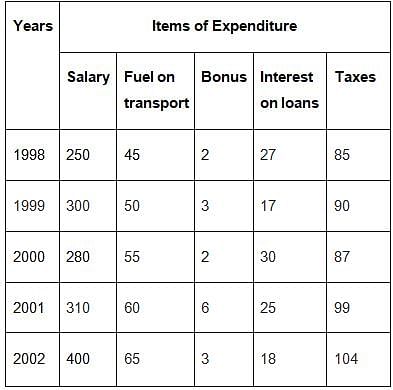
Expenditures of a Company (in Lakh Rupees) per Annum Over the given Years
The total amount of bonus paid by the company during the given period is approximately what percent of the total amount of salary paid during this period?
Study the following table and answer the questions (Q.22 - Q.23) based on it.
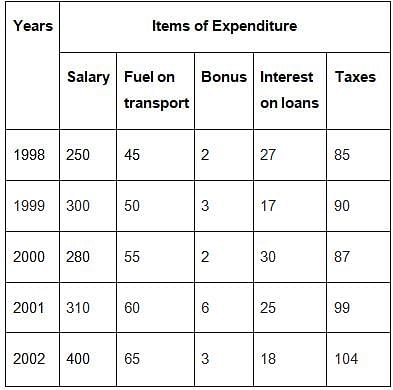
Expenditures of a Company (in Lakh Rupees) per Annum Over the given Years
The ratio between the total expenditure on Taxes for all the years and the total expenditure on Fuel and Transport for all the years respectively is approximate?
if the HCF of two numbers (each greater than 15) be 15 and LCM be 315, then the sum of numbers will be
A certain number when divided by 247 leaves a remainder 17, another number when divided by 361 leaves a remainder 52. What is the remainder when the sum of these two numbers is divided by 19?
find the least value of “b” for which 67b326 is divisible by 3?
From ‘apparel to aerospace’, ‘steel to software’, the pace of technological innovation is quickening. No longer can companies afford to miss generation of technology and expect to remain competitive. Adding to the pressure, innovations are increasingly crossing industry boundaries; a new fibre developed by the textile industry has potential for building materials and medical equipment. Some companies are adept at using a diversity of technologies to create new products that transform markets. But many others are floundering because they rely on a technology strategy that no longer works in such a fast changing environment. The difference between success and failure is not how much a company spends on research and development
(R&D), but how it approaches it. There are two possible approaches. Either a company can invest in R&D that uses an older generation of technology, the ‘breakthrough’ approach-or its focus on combining existing technologies into hybrid technologies - the ‘technologies fusion’ approach. It blends incremental technical improvements from several previously separate fields of technology to create products that revolutionise markets. In a world where the old maxim ‘one technology one industry’ no longer applies, a singular breakthrough strategy is inadequate; companies need to include both the breakthrough and fusion approaches in their technology strategy. Relying on breakthroughs alone fails because it focuses the R&D efforts to narrowly, ignoring the possibilities of combining technologies. Yet many western companies still rely almost exclusively - on the breakthrough approach. The reasons are complex: a distrust of outside innovations and not-invented here engineering and arrogance and aversion to sharing research results.
Which of the following would correctly reflect the position regarding the two approaches to technology adoption?
From ‘apparel to aerospace’, ‘steel to software’, the pace of technological innovation is quickening. No longer can companies afford to miss generation of technology and expect to remain competitive. Adding to the pressure, innovations are increasingly crossing industry boundaries; a new fibre developed by the textile industry has potential for building materials and medical equipment. Some companies are adept at using a diversity of technologies to create new products that transform markets. But many others are floundering because they rely on a technology strategy that no longer works in such a fast changing environment. The difference between success and failure is not how much a company spends on research and development
(R&D), but how it approaches it. There are two possible approaches. Either a company can invest in R&D that uses an older generation of technology, the ‘breakthrough’ approach-or its focus on combining existing technologies into hybrid technologies - the ‘technologies fusion’ approach. It blends incremental technical improvements from several previously separate fields of technology to create products that revolutionise markets. In a world where the old maxim ‘one technology one industry’ no longer applies, a singular breakthrough strategy is inadequate; companies need to include both the breakthrough and fusion approaches in their technology strategy. Relying on breakthroughs alone fails because it focuses the R&D efforts to narrowly, ignoring the possibilities of combining technologies. Yet many western companies still rely almost exclusively - on the breakthrough approach. The reasons are complex: a distrust of outside innovations and not-invented here engineering and arrogance and aversion to sharing research results.
Which of the following features of technology has been highlighted most prominently by the author of the passage?
From ‘apparel to aerospace’, ‘steel to software’, the pace of technological innovation is quickening. No longer can companies afford to miss generation of technology and expect to remain competitive. Adding to the pressure, innovations are increasingly crossing industry boundaries; a new fibre developed by the textile industry has potential for building materials and medical equipment. Some companies are adept at using a diversity of technologies to create new products that transform markets. But many others are floundering because they rely on a technology strategy that no longer works in such a fast changing environment. The difference between success and failure is not how much a company spends on research and development
(R&D), but how it approaches it. There are two possible approaches. Either a company can invest in R&D that uses an older generation of technology, the ‘breakthrough’ approach-or its focus on combining existing technologies into hybrid technologies - the ‘technologies fusion’ approach. It blends incremental technical improvements from several previously separate fields of technology to create products that revolutionise markets. In a world where the old maxim ‘one technology one industry’ no longer applies, a singular breakthrough strategy is inadequate; companies need to include both the breakthrough and fusion approaches in their technology strategy. Relying on breakthroughs alone fails because it focuses the R&D efforts to narrowly, ignoring the possibilities of combining technologies. Yet many western companies still rely almost exclusively - on the breakthrough approach. The reasons are complex: a distrust of outside innovations and not-invented here engineering and arrogance and aversion to sharing research results.
What, according to the author, is adding to the pressure on the companies?
Milankovitch proposed in the early twentieth century that the ice ages were caused by variations in the Earth’s orbit around the Sun. For some time, this theory was considered untestable, largely because there was no sufficiently precise chronology of the ice ages with which the orbital variations could be matched. To establish such a chronology, it is necessary to determine the relative amounts of land ice that existed at various times in the Earth’s past. A recent discovery makes such a determination possible: relative land-ice volume for a given period can be deduced from the ratio of two oxygen isotopes, 16 and 18, found in ocean sediments. Almost all the oxygen in water is oxygen 16, but a few molecules out of every thousand incorporate the heavier isotope 18.
When an ice age begins, the continental ice sheets grow, steadily reducing the amount of water evaporated from the ocean that will eventually return to it. Because heavier isotopes tend to be left behind when water evaporates from the ocean surfaces, the remaining ocean water becomes progressively enriched in oxygen 18. The degree of enrichment can be determined by analyzing ocean sediments of the period, because these sediments are composed of calcium carbonate shells of marine organisms, shells that were constructed with oxygen atoms drawn from the surrounding ocean. The higher the ratio of oxygen 18 to oxygen 16 in a sedimentary specimen, the more land ice there was when the sediment was laid down.
According to the passage, which of the following is true of the ratios of oxygen isotopes in ocean sediments?








